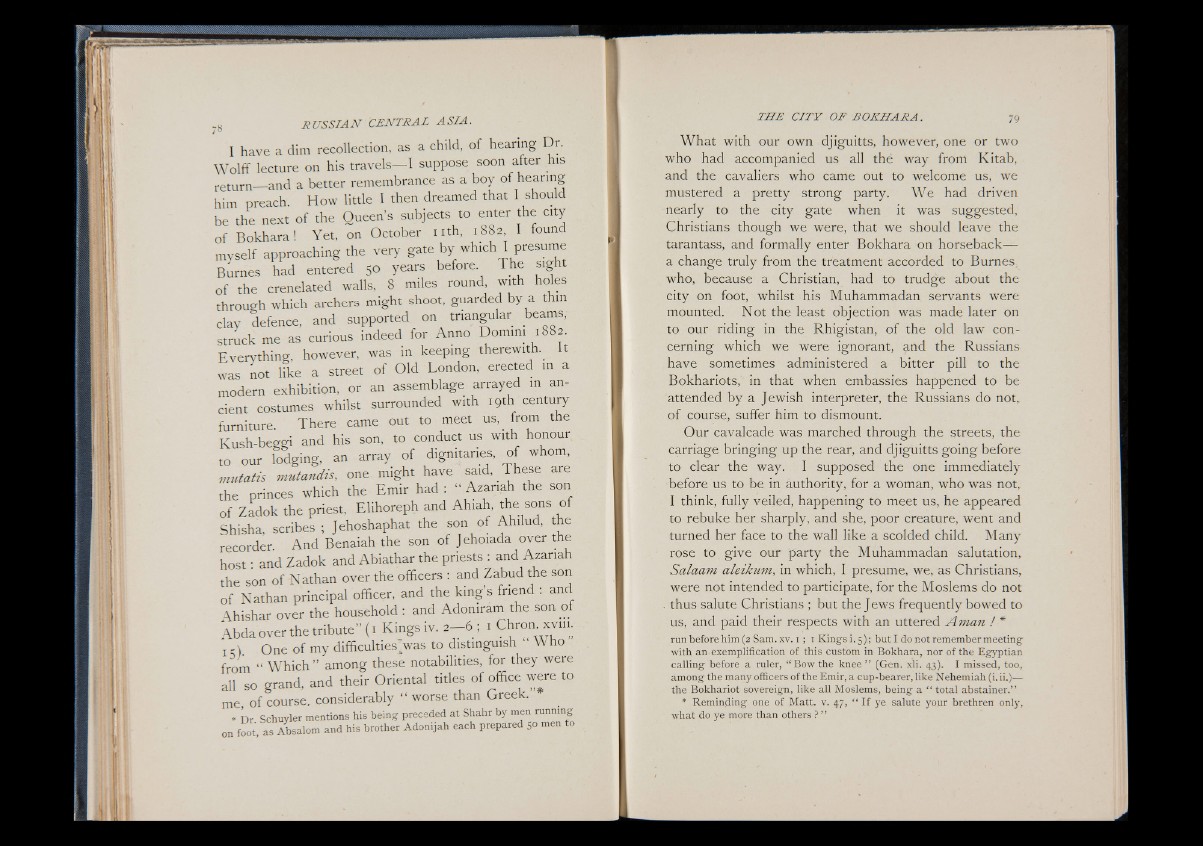
I have a dim recollection, as a child, of hearing Dr.
Wolff lecture on his travels— I suppose soon after his
return— and a better remembrance as a boy of hearing
him preach. How little I then dreamed that I should
be the next of the Queen’s subjects to enter the city
of Bokhara! Yet, on October n th , 1882 I found
myself approaching the very gate by which I presume
Burnes had entered 50 years before The sight
of the crenelated walls, 8 miles round, with holes
through which archers might shoot, guarded by a thin
clay defence, and supported on triangular beams,
struck me as curious indeed for Anno Domini 1882.
Everything, however, was in keeping therewith. It
was not like a street of Old London, erected in a
modern exhibition, or an assemblage arrayed m ancient
costumes whilst surrounded with 19th century
furniture. There came out to meet us, from the
Kush-beggi and his son, to conduct us with honour
to our lodging, an array of dignitaries, of whom,
mutatis mutandis, one might have said, These are
the princes which the Emir had: “ Azanafr the son
of Zadok the priest, Elihoreph and Ahiah the sons of
Shisha, scribes ; Jehoshaphat the son of Ahilud, the
recorder. And Benaiah the son of Jehoiada over the
host • and Zadok and Abiathar the priests : and Azanah
the son of Nathan over the officers : and Zabud the son
of Nathan principal officer, and the king’s friend I an
Ahishar over the household : and Adomram the son of
Abda over the tribute” (1 Kings iv. 2— 6 ; 1 Chron xvm.
1 «A One of my difficulties’was to distinguish 1 Who
from “ Which ” among these notabilities, for they were
all so grand, and their Oriental titles of office were to
me o f course, considerably “ worse than Greek.”
* Dr Schuyler mentions his being preceded at Shahr by men running
on foot, as Absalom and his brother Adonijah each prepared 50 men to
What with our own djiguitts, however, one or two
who had accompanied us all thé way from Kitab,
and the cavaliers who came out to welcome us, we
mustered a pretty strong party. We had driven
nearly to the city gate when it was suggested,
Christians though we were, that we should leave the
tarantass, and formally enter Bokhara on horseback—
a change truly from the treatment accorded to Burnes,
who, because a Christian, had to trudge about the
city on foot, whilst his Muhammadan servants were
mounted. Not the least objection was made later on
to our riding in the Rhigistan, of the old law concerning
which we were ignorant, and the Russians
have sometimes administered a bitter pill to the
Bokhariots,' in that when embassies happened to be
attended by a Jewish interpreter, the Russians do not,
of course, suffer him to dismount.
Our cavalcade was marched through the streets, the
carriage bringing up the rear, and djiguitts going before
to clear the way. I supposed the one immediately
before us to be in authority, for a woman, who was not,
I think, fully veiled, happening to meet us, he appeared
to rebuke her sharply, and she, poor creature, went and
turned her face to the wall like a scolded child. Many
rose to give our party the Muhammadan salutation,
Salaam aleikum, in which, I presume, we, as Christians,
were not intended to participate, for the Moslems do not
. thus salute Christians ; but the J ews frequently bowed to
us, and paid their respects with an uttered Aman ! *
run before him (2 Sam. xv. 1 ; r Kings i. 5),; but I do not remember meeting
with an exemplification of this custom in Bokhara, nor of the Egyptian
calling before a ruler, “ Bow the knee” (Gen. xli. 43). I missed, too,
among the many officers of the Emir, a cup-bearer, like Nehemiah (i. ii.)—
the Bokhariot sovereign, like all Moslems, being a “ total abstainer.”
* Reminding one of Matt. v. 47, “ If ye salute your brethren only,
what do ye more than others ? ’ ’